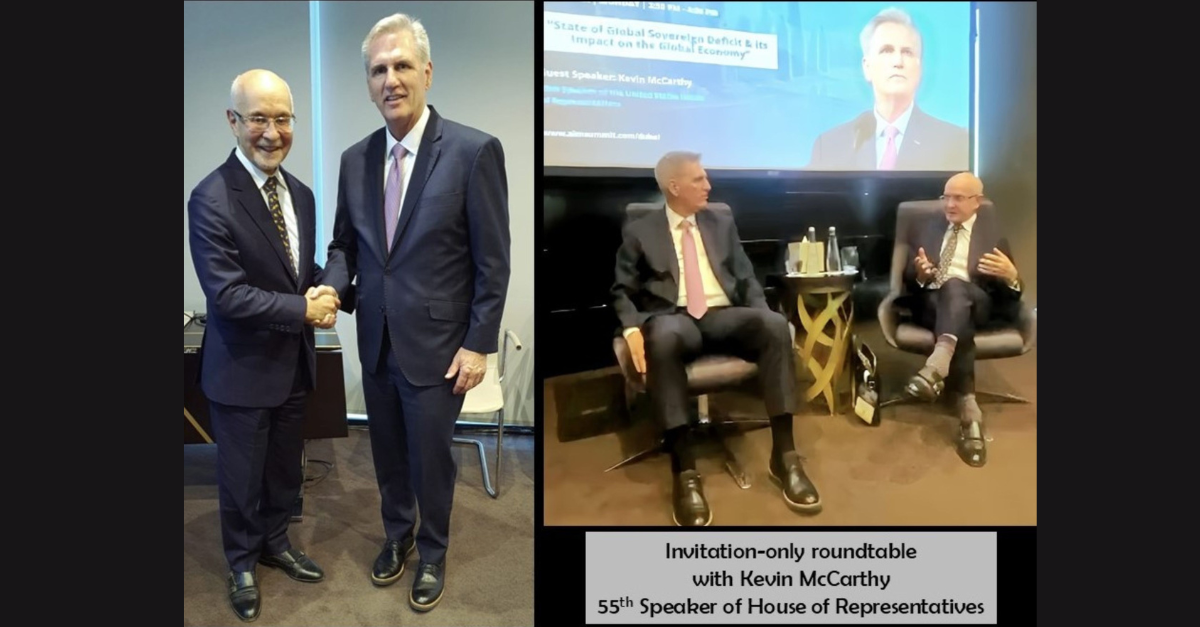Kevin McCarthy and David Gibson-Moore Discuss Global Sovereign Debt and Emerging Market Volatility at AIM Summit Dubai

The AIM Summit in Dubai once again stood as a beacon for high-level discourse on economic policy, financial risk, and geopolitical transformation. At the heart of the summit was a roundtable featuring Kevin McCarthy, former Speaker of the U.S. House of Representatives, and David Gibson-Moore, President of Gulf Analytica. The Kevin McCarthy sovereign debt discussion captured global attention as it examined the future of economic governance amidst rising debt, shifting power structures, and institutional decay.
The Global Sovereign Debt Crisis: A Looming Economic Time Bomb
At the roundtable, both leaders delved into a critical global sovereign debt crisis analysis, emphasizing how debt is no longer just a fiscal issue but a looming geopolitical risk. With advanced economies like the U.S., UK, and Japan experiencing record-high debt-to-GDP ratios, the conversation warned that excessive borrowing can weaken economic foundations and increase exposure to international shocks.
McCarthy argued that debt without discipline is a recipe for inflation, lowered credit ratings, and reduced fiscal autonomy. Gibson-Moore added that a transparent and globally coordinated debt framework is urgently needed to avoid systemic collapse.
Political Polarization in Western Democracies: A Risk Beyond Politics
One of the most concerning topics was the rising political polarization in Western democracies. McCarthy pointed out that hyper-partisan divisions in Congress, media echo chambers, and voter distrust are undermining the very institutions designed to protect economic integrity.
This polarization not only paralyzes governments but also sends shockwaves through financial markets. Investors look for stable, predictable governance—conditions that are increasingly rare in democracies struggling with ideological extremes.
To counter this, both speakers promoted Cross-Party Collaboration Initiatives. McCarthy noted that only through bipartisan cooperation can nations stabilize economies, enact balanced policies, and restore public faith in democratic institutions.
EM-ification of the U.S. Economy: A Troubling Comparison
A striking concept introduced at the summit was the "EM-ification of the U.S. economy"—a term used to describe how the U.S. is now displaying attributes of emerging markets. Gibson-Moore compared the volatility, weakened institutional checks, and frequent policy reversals in the U.S. to behaviors seen in developing economies.
Despite the U.S. agricultural sector and urban expansion potential, the country is facing an erosion of governance norms and political accountability. This shift not only threatens U.S. economic dominance but also alters the global perception of the American model.
Challenges of Economic Volatility in Emerging Markets
While developed economies are experiencing institutional fatigue, emerging markets are grappling with their own set of challenges. Currency depreciation, inflation spikes, geopolitical conflicts, and foreign debt dependency have made these nations highly vulnerable.
According to Gibson-Moore, the challenges of economic volatility in emerging markets are compounded by unpredictable commodity prices and reduced access to international capital. He warned that without structural reforms and stronger governance, emerging economies could fall into a prolonged cycle of stagnation.
Emerging Market Trends at AIM Summit
Despite these hurdles, the emerging market trends at AIM Summit gave reasons for cautious optimism. Digital transformation, renewable energy investments, and youthful populations are driving growth in countries across Africa, Southeast Asia, and Latin America.
Speakers at the summit highlighted the importance of regional trade agreements, infrastructure funding, and multilateral cooperation to ensure these economies can weather global uncertainties and attract long-term investments.
The Road Ahead: Stability Through Leadership and Reform
The discussion between Kevin McCarthy and David Gibson-Moore at AIM Summit Dubai emphasized the need for agile, informed leadership in a time of complex global change. The way forward is not just about policy tweaks—it requires a cultural shift in governance, public engagement, and financial responsibility.
Leaders must not only stabilize their own economies but also actively participate in shaping a cohesive international order that can address shared challenges like debt distress, climate change, and digital transformation.
Frequently Asked Questions (FAQs)
Q1: What is the main takeaway from Kevin McCarthy’s speech at the AIM Summit Dubai?
A: McCarthy emphasized the urgent need for fiscal discipline in managing sovereign debt and warned about the dangers of political polarization undermining economic stability.
Q2: What does "EM-ification of the U.S. economy" mean?
A: It refers to the U.S. increasingly exhibiting traits common in emerging markets—such as institutional weakness, economic unpredictability, and rising political instability.
Q3: How is political polarization impacting the global economy?
A: It paralyzes effective governance, undermines investor confidence, and delays crucial policy reforms, leading to greater financial volatility.
Q4: What are the biggest risks facing emerging markets today?
A: Currency devaluation, debt servicing burdens, inflation, and a dependency on developed nations’ monetary policies are major concerns.
Q5: What solutions were proposed at the AIM Summit for global economic stability?
A: The summit stressed cross-party collaboration, transparent debt management, and stronger institutional governance in both developed and emerging economies.
Conclusion: A Call for Global Responsibility
The Kevin McCarthy sovereign debt discussion at AIM Summit Dubai was a clarion call for responsible governance in an increasingly chaotic world. From the EM-ification of the U.S. economy to the fragile state of emerging markets, the roundtable delivered crucial insights into a complex global future.
The urgency to stabilize institutions, manage debt, reduce polarization, and encourage bipartisan cooperation has never been greater. Whether in Washington or Nairobi, the time for courageous, forward-thinking leadership is now.
- Art
- Causes
- Crafts
- Dance
- Drinks
- Film
- Fitness
- Food
- Jogos
- Gardening
- Health
- Início
- Literature
- Music
- Networking
- Outro
- Party
- Religion
- Shopping
- Sports
- Theater
- Wellness


